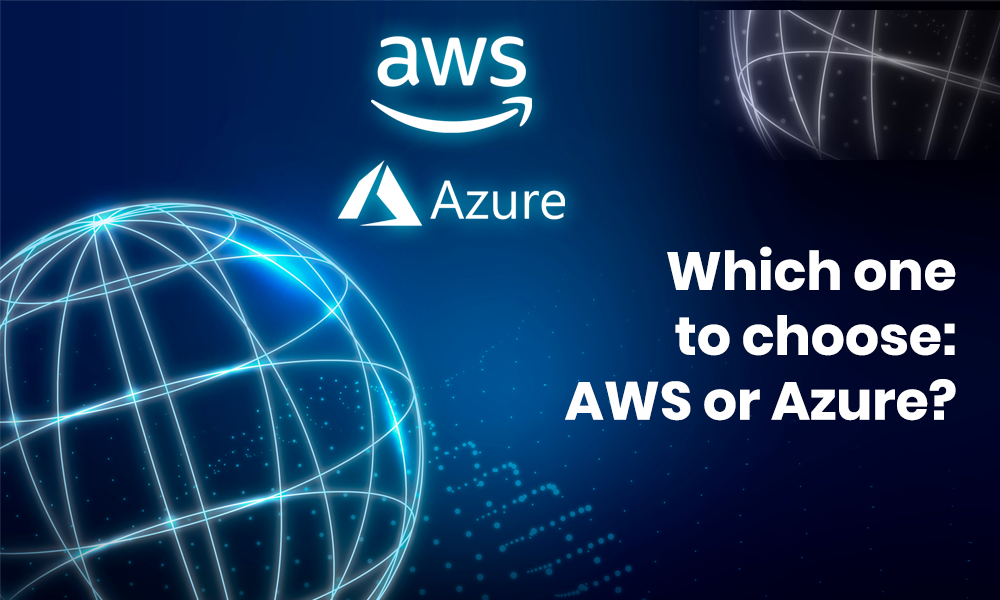Serverless Battle: Azure VS AWS
Table of Contents
ToggleSetting up your Server? Eyeing on Serverless Architecture? Caught up between Azure VS AWS? Here is an article for you that will help you decide what is best for you.
Most firms want to maximize the return on their IT infrastructure investment as quickly as possible. Cloud-based services are an excellent choice for businesses looking to leverage their IT investments. As a result, cloud vendors are addressing the challenge by upgrading their services to provide greater flexibility and alternatives for human interaction, resulting in a serverless architecture.
Cloud service battles are not new in the world of serverless architecture. Serverless computing is a software design platform that hosts programs through third-party services, eliminating the need for the developer to manage servers.
The major benefit is that businesses do not have to pay the vendor for any fixed bandwidth. They pay as peruse, which can be increased or decreased at any moment. It also eliminates essential infrastructure management tasks such as operating system maintenance, patching, server provisioning, and others.
Now, let us discover which cloud service is the best fit for developing serverless architecture. Here, we will have a comparison between Azure VS AWS.
What are Amazon web services (AWS)?
AWS services are intended to interact with one another to deliver an optimized and reliable result. AWS services are classified into three types: infrastructure as a service (IaaS), software as a service (SaaS), and platform as a service (PaaS) (PaaS). AWS was created in 2006 and has since become the best cloud platform accessible today.
What is Microsoft Azure?
Microsoft Azure was founded in 2010, and it has since grown to become one of the largest commercial cloud services. It provides a wide range of integrated cloud services and features like analytics, computing, networking, database, storage, mobile, and web applications that connect effortlessly with your environment to maximize efficiency and scalability.
One-To-One Comparison between AWS VS Azure
AWS VS Azure isn’t an easy comparison as both have their benefits and challenges, go through the below difference to get a clear picture of which one is best for you.
- STORAGE
AWS: Storage is the cloud provider’s most important offering. AWS employs the Simple Storage Service, which has been in operation for longer than Azure and has a wealth of documentation and tutorials. It provides Glacier archive storage, data archiving, and S3 infrequent access.
Azure: Azure stores data in Storage Block Blobs, which are made up of blocks, and efficiently upload big blobs. It archives data using Storage cool and Storage archive.
- NETWORKING
AWS: Cloud providers provide various partners and networks that will interconnect with data centers utilizing various products. AWS’s networking is handled by a virtual private cloud, and cross-premises connectivity is handled by an API gateway. Elastic load balancing is used by AWS to balance load while networking.
Azure: For networking or content delivery, Azure employs a virtual network, and for cross-premises communication, it employs a VPN gateway. It manages load balancing during content delivery using a load balancer and an application gateway.
- INSTALLING APPS
AWS: Elastic Beanstalk, Batch, Lambda, container service, and other AWS services provide similar options. However, it does not have many app hosting features.
Azure: One of the benefits of cloud providers is the ease with which an application may be deployed. As we wish to deploy our software on numerous servers virtually using PaaS functionalities. Azure provides a variety of app installation options such as cloud services, container services, functions, batch, app services, and so on.
- DATABASE
AWS: Almost all cloud providers allow you to set up a database in both SQL and NoSQL solutions. AWS provides a relational database as a service via RDS, a NoSQL database via Dynamo DB, and caching via Elastic Cache.
Azure: For relational databases, Azure employs SQL database, MySQL, and PostgreSQL; for NoSQL technologies, it employs Cosmos DB; and for caching, it employs Redis Cache.
- OPEN SOURCE DEVELOPMENT
AWS: AWS is ideal for open source developers because it welcomes Linux customers and provides a variety of open-source connectors.
Azure: Azure allows enterprise customers to connect to the Azure cloud platform using their current active directory account, which runs the dot net framework on Windows, Linux, and macOS.
Which One is to choose?
After comparing AWS and Azure it is still difficult to find which is better for your needs?
Microsoft Azure has grown its market share in recent years, but not to the point where the two businesses are in direct competition, at least for the time being. Furthermore, both firms debut new products, integrations, and pricing models. As a result, the ultimate decision will be based on your company’s requirements.
Concluding Lines
We hope you now have a better grasp of the services provided by these AWS vs AZURE cloud providers and can choose the best cloud provider for your needs. AWS is a good option if you need Infrastructure as a Service (IaaS) or a large range of services and tools. Azure is a good option if you need Windows integration or a good platform as a service (PaaS) cloud provider.
Looking for additional information? Please feel free to contact us to schedule a meeting with one of our experts. ReapMind Innovations would be pleased to talk about your specific business needs and offer advice on how to get the most out of your cloud investment.


























































































































































